鲁教版四年级英语知识点总结
鲁科版四年级英语上册语法汇总
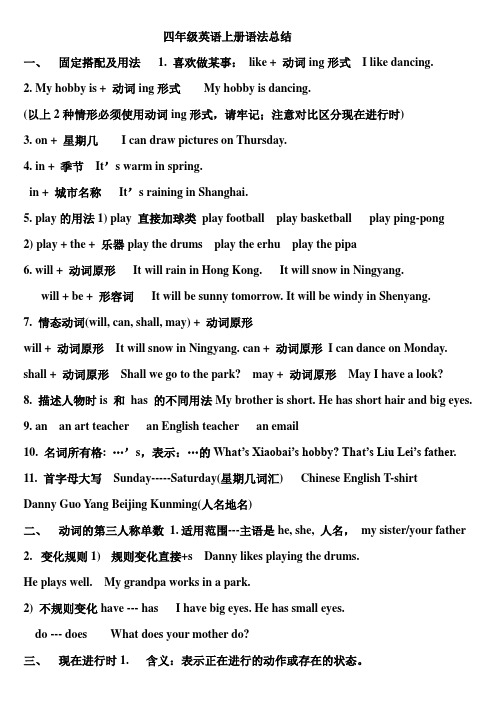
四年级英语上册语法总结一、固定搭配及用法 1. 喜欢做某事:like + 动词ing形式I like dancing.2. My hobby is + 动词ing形式My hobby is dancing.(以上2种情形必须使用动词ing形式,请牢记;注意对比区分现在进行时)3. on + 星期几I can draw pictures on Thursday.4. in + 季节It’s warm in spring.in + 城市名称It’s raining in Shanghai.5. play的用法1) play 直接加球类play football play basketball play ping-pong2) play + the + 乐器play the drums play the erhu play the pipa6. will + 动词原形It will rain in Hong Kong. It will snow in Ningyang.will + be + 形容词It will be sunny tomorrow. It will be windy in Shenyang.7. 情态动词(will, can, shall, may) + 动词原形will + 动词原形It will snow in Ningyang. can + 动词原形I can dance on Monday. shall + 动词原形Shall we go to the park? may + 动词原形May I have a look?8. 描述人物时is 和has 的不同用法My brother is short. He has short hair and big eyes.9. an an art teacher an English teacher an email10. 名词所有格: …’s,表示:…的What’s Xiaobai’s hobby?That’s Liu Lei’s father.11. 首字母大写Sunday-----Saturday(星期几词汇) Chinese English T-shirtDanny Guo Y ang Beijing Kunming(人名地名)二、动词的第三人称单数 1. 适用范围---主语是he, she, 人名,my sister/your father2. 变化规则1) 规则变化直接+s Danny likes playing the drums.He plays well. My grandpa works in a park.2) 不规则变化have --- has I have big eyes. He has small eyes.do --- does What does your mother do?三、现在进行时1. 含义:表示正在进行的动作或存在的状态。
四年级上册英语-重点复习_鲁科版

季节单词:
spring 春天 summer 夏天
autumn 秋天 winter 冬天
气候单词:
warm 温暖的 hot 热的
cool 凉爽的 cold 寒冷的
衣着单词:
T—shirt T恤衫 jacket 夹克衫
sweater 毛衣 coat 外套 cap 帽子
重点短语:
fly my kite / fly kites 放风筝
第五单元的重点:
天气单词(黑板上画出天气图例再复习一遍) sunny 晴朗的 cloudy 多云的 windy 有风的 snow 下雪 rain 下雨 重点短语: put on 穿 climb the hill 爬山 go to the zoo 去动物园 go to the park 去公园
1. Put on your jacket. 2. Put on your raincoat. 3. Let’s go and climb the hill.
第一单元的重点:
1. ---- What subjects do we / you have this morning / afternoon? What subjects do we / you have at school?
---- We have Chinese, maths, English, music, PE and computer studies.
第五单元的重点:
1. ---- How is the weather in Beijing today? ---- It is sunny. / It’s cloudy. / It’s windy.
It is raining. / It’s snowing. 2. ---- How’s the weather in Zibo tomorrow? ---- It will be sunny. / It will be cloudy.
五四制2022年山东泰安四年级上册英语知识点总结(鲁科版)
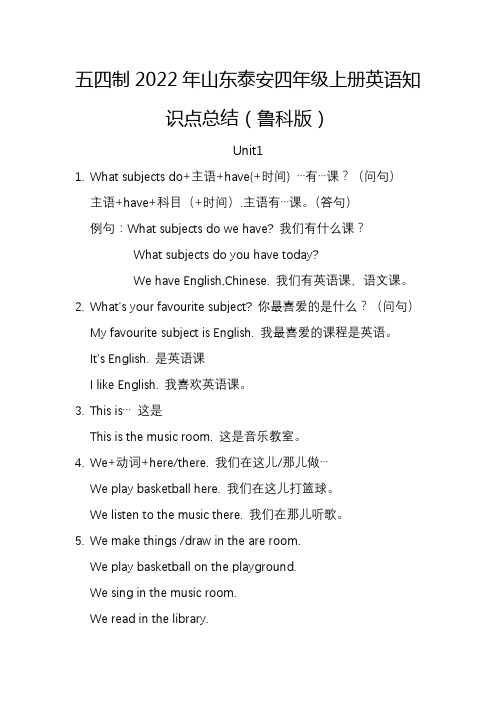
五四制2022年山东泰安四年级上册英语知识点总结(鲁科版)Unit11.What subjects do+主语+have(+时间) …有…课?(问句)主语+have+科目(+时间).主语有…课。
(答句)例句:What subjects do we have? 我们有什么课?What subjects do you have today?We have English,Chinese. 我们有英语课,语文课。
2.W hat’s your favourite subject? 你最喜爱的是什么?(问句)My favourite subject is English. 我最喜爱的课程是英语。
I t’s English. 是英语课I like English. 我喜欢英语课。
3.This is…这是This is the music room. 这是音乐教室。
4.We+动词+here/there. 我们在这儿/那儿做…We play basketball here. 我们在这儿打篮球。
We listen to the music there. 我们在那儿听歌。
5.We make things /draw in the are room.We play basketball on the playground.We sing in the music room.We read in the library.Unit21、Do you like+名词/动名词?你喜欢…吗?(问句)肯定回答:Yes,I do. 是的,我喜欢。
否定回答:N o,I don’t. 不,我不喜欢。
例句:Do you like drawing?你喜欢画画吗?Yes,I do.是的,我喜欢。
Do you like football?No,I don’t. 不,我不喜欢。
2、主语(单三)+动词单三形式+其他主语(单三):he/she/it/Jenny/My mum…(都是一个人)动词单三形式:一般动词+s,如like-likes;其他形式如:go-goes; study-studies例句:He likes singing.他喜欢唱歌。
鲁科版四年级英语上册英语单词和句型汇总
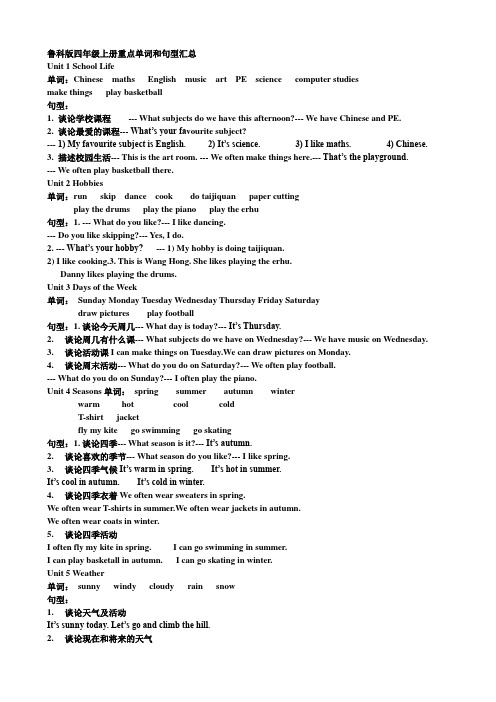
鲁科版四年级上册重点单词和句型汇总Unit 1 School Life单词:Chinese maths English music art PE science computer studiesmake things play basketball句型:1. 谈论学校课程--- What subjects do we have this afternoon?--- We have Chinese and PE.2. 谈论最爱的课程--- What’s your fa vourite subject?--- 1) My favourite subject is English. 2) It’s science. 3) I like maths. 4) Chinese.3. 描述校园生活--- This is the art room. --- We often make things here.--- That’s the playground.--- We often play basketball there.Unit 2 Hobbies单词:run skip dance cook do taijiquan paper cuttingplay the drums play the piano play the erhu句型:1. --- What do you like?--- I like dancing.--- Do you like skipping?--- Yes, I do.2. --- What’s your hobby? --- 1) My hobby is doing taijiquan.2) I like cooking.3. This is Wang Hong. She likes playing the erhu.Danny likes playing the drums.Unit 3 Days of the Week单词:Sunday Monday Tuesday Wednesday Thursday Friday Saturdaydraw pictures play football句型:1. 谈论今天周几--- What day is today?--- It’s Thursday.2. 谈论周几有什么课--- What subjects do we have on Wednesday?--- We have music on Wednesday.3. 谈论活动课I can make things on Tuesday.We can draw pictures on Monday.4. 谈论周末活动--- What do you do on Saturday?--- We often play football.--- What do you do on Sunday?--- I often play the piano.Unit 4 Seasons单词:spring summer autumn winterwarm hot cool coldT-shirt jacketfly my kite go swimming go skating句型:1. 谈论四季--- What season is it?--- It’s autumn.2. 谈论喜欢的季节--- What season do you like?--- I like spring.3. 谈论四季气候It’s warm in spring. It’s hot in summer.It’s cool in autumn. It’s cold in winter.4. 谈论四季衣着We often wear sweaters in spring.We often wear T-shirts in summer.We often wear jackets in autumn.We often wear coats in winter.5. 谈论四季活动I often fly my kite in spring. I can go swimming in summer.I can play basketall in autumn. I can go skating in winter.Unit 5 Weather单词:sunny windy cloudy rain snow句型:1. 谈论天气及活动It’s sunny today. Let’s go and climb the hill.2. 谈论现在和将来的天气1) 谈论今天的天气--- How’s the weather today?--- It’s cloudy.2) 谈论明天的天气--- How’s the weather tomorrow?--- It will be cloudy.3. 谈论某个城市的天气It’s raining in Shanghai. It’s windy in Sanya.--- How’s the weather in Harbin tomorrow?--- It will snow.4. 预报天气It will rain in Hong Kong.It will be sunny in Shenyang.Unit 6 Family单词:tall short strong long hair short hairbusinessman nurse policeman gardenerhospital park句型:1. 谈论家人外貌My father is tall and strong. He has short hair.My mother has long hair and big eyes.2. 谈论家人职业--- What does your mother do?--- She’s an art teacher.--- What does your father do?--- He’s a businessman.3. 谈论家人工作地点My mother works in a hospital.My grandpa works in a park.Unit 7 Communications单词:call speak write(write an email)jump---long jump high jump句型:1. 电话用语--- This is Jenny speaking. May I speak to Li Ming?--- This is Li Ming speaking.--- Shall we go to the library t omorrow? / Let’s go to the library tomorrow.--- OK. / Sorry.2. 谈论正在做的事情--- What are you doing?--- I’m writing an email.--- What’s Wang Hong doing? --- She’s doing the long jump.Danny is doing the high jump.易混词汇here(这里) there(那里) three(3)Tuesday(周二) Thursday(周四)tall(高的) call(打电话)put on(穿上) come on(赶快) hold on(稍等;别挂电话)well(好,令人满意地) will(将会) hill(小山)warm(温暖的) wear(穿)多词性词汇以下4个单词既可作名词,又可作动词rain(雨;下雨)snow(雪;下雪)work(作品;工作)cook(厨师;做饭)。
鲁教版四年级知识点

四年级下册英语知识点U1Countries1.Welcome to China.2.Where are you from? I’m/We’re from Britain.3.Where’s she/he from?She’s/He’s from India.4.Where do you live?I live in London.5.Is she from America?No,she isn’t.She’s from France.6.They’re our new friends.7.London is famous.U2Housework1.Let’s do housework.2.Can you clean the window?Yes,I can./No,I can’t.3.What are you doing?I’m watering the flowers.4.What’s she doing?She’s washing the dishes.5.Where’s dad?He’s in the kitchen.6.Are you playing computer games? No,we aren’t.7.Lunch is ready.U3Restaurant1.I’m hungry.It’s time for lunch.2.What do you want to eat?I want to eat jiaozi.3.What would you like?I’d like rice and potatoes.4.Would you like some soup?Yes,tomato soup,please.5.Would you like something to drink?Yes,I’d like some pear juice.6.Have some fruit,please.OK,I like bananas.7.Shall we eat out? OK!Let’s go!U4Weekend1.Have a nice weekend.2.What do you do at the weekend?I often take pictures.Sometimes I go to the museum.3.What does your mother do at the weekend?She often goes shopping.4.Do you often take pictures?Yes,I do.5.Does he often play the violin?Yes,he does/No,he doesn’t.U5Shopping1.Can I help you?I’d like a toy,please.2.How about this toy bus?It’s too big.I want a toy car.3.Excuse me.Do you have schoolbags?Yes,we do./ Sorry we don’t.4.How much is this shirt?It’s one hundred yuan.I’ll take it.5.How much are they?They’re fifty-eight yuan.OK,we’ll take them.6.How much are they?They’re fifty-eight yuan.OK,we’ll take them.7.I’d like a toy,please.U6Travel1.Summer vacation is coming.2.Are you going to travel?Yes,I’m going to Mount Taishan.3.Where are you going?I’m going to the Shaolin Temple.4.How are you going there?I’m going there by train.5.What are you going to do?I’m going to learn Kungfu.6.Have a good time, boys and girls!。
鲁科版四年级上册英语每单元重要学习内容
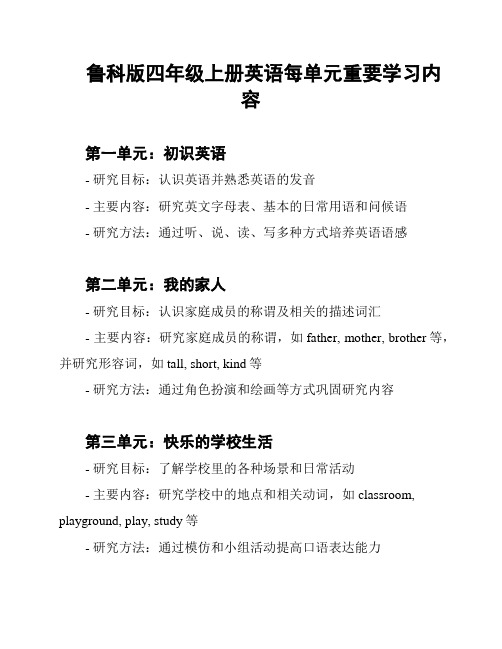
鲁科版四年级上册英语每单元重要学习内容第一单元:初识英语- 研究目标:认识英语并熟悉英语的发音- 主要内容:研究英文字母表、基本的日常用语和问候语- 研究方法:通过听、说、读、写多种方式培养英语语感第二单元:我的家人- 研究目标:认识家庭成员的称谓及相关的描述词汇- 主要内容:研究家庭成员的称谓,如father, mother, brother等,并研究形容词,如tall, short, kind等- 研究方法:通过角色扮演和绘画等方式巩固研究内容第三单元:快乐的学校生活- 研究目标:了解学校里的各种场景和日常活动- 主要内容:研究学校中的地点和相关动词,如classroom, playground, play, study等- 研究方法:通过模仿和小组活动提高口语表达能力第四单元:美丽的大自然- 研究目标:认识自然界中的各种动物和植物- 主要内容:研究动物和植物的名称以及它们的特征和性- 研究方法:通过观察、讨论和拓展阅读增加对自然界的了解第五单元:和谐的社区- 研究目标:认识社区中的各种场景和社交活动- 主要内容:研究社区中的地点和相关活动,如hospital, supermarket, visit, help等- 研究方法:通过角色扮演和小组讨论提高实际应用能力第六单元:华丽的舞台- 研究目标:了解戏剧表演相关的词汇和表达方式- 主要内容:研究戏剧表演中的角色、服装和动作等相关词汇- 研究方法:通过戏剧表演和创作小剧本提高口语表达能力第七单元:我爱运动- 研究目标:认识不同种类的运动和与之相关的动词短语- 主要内容:研究运动项目及对应的动作,如play football, swim, ride a bike等- 研究方法:通过运动实践和小组活动巩固研究内容第八单元:美食与饮品- 研究目标:了解不同的食物和饮料,并研究相关表达方式- 主要内容:研究食物和饮料的名称以及如何进行点菜和表达口味- 研究方法:通过实践点菜和模拟情境提高口语表达能力第九单元:时尚与艺术- 研究目标:认识不同的服饰和相关艺术品,并研究形容词描述- 主要内容:研究服饰和艺术品的名称以及相关形容词,如beautiful, fashionable等- 研究方法:通过观察和模仿,提高对时尚和艺术的理解和表达能力第十单元:快乐的假期- 研究目标:了解不同的节假日和与之相关的活动及表达方式- 主要内容:研究各种节假日的名称以及与之相关的活动,如celebrate, give gifts等- 研究方法:通过讨论和小组活动,练节假日相关的表达和交流。
鲁科版四年级上册英语每单元重要概念
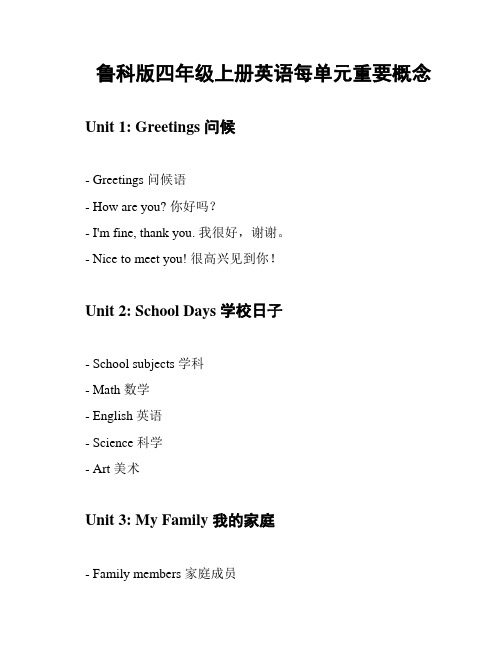
鲁科版四年级上册英语每单元重要概念Unit 1: Greetings 问候- Greetings 问候语- How are you? 你好吗?- I'm fine, thank you. 我很好,谢谢。
- Nice to meet you! 很高兴见到你!Unit 2: School Days 学校日子- School subjects 学科- Math 数学- English 英语- Science 科学- Art 美术Unit 3: My Family 我的家庭- Family members 家庭成员- Father 爸爸- Mother 妈妈- Brother 兄弟- Sister 姐妹Unit 4: My Daily Routine 我的日常生活- Daily activities 日常活动- Wake up 起床- Have breakfast 吃早饭- Go to school 去学校- Do homework 做作业Unit 5: Food and Drinks 食物和饮料- Food 食物- Rice 米饭- Noodles 面条- Fruit 水果- Vegetables 蔬菜Unit 6: At the Park 在公园- Park activities 公园活动- Swing 秋千- Slide 滑梯- Play ball 打球- Ride a bike 骑自行车Unit 7: Weather 天气- Weather conditions 天气状况- Sunny 晴天- Cloudy 多云- Rainy 下雨- Windy 刮风Unit 8: Our Pets 我们的宠物- Pets 宠物- Cat 猫- Dog 狗- Fish 鱼- Bird 鸟Unit 9: Festivals and Holidays 节日和假日- Festivals 节日- Chinese New Year 中国新年- Christmas 圣诞节- Easter 复活节- Halloween 万圣节Unit 10: Colors and Shapes 颜色和形状- Colors 颜色- Red 红色- Blue 蓝色- Yellow 黄色- Green 绿色Unit 11: My Body 我的身体- Body parts 身体部位- Head 头- Eyes 眼睛- Nose 鼻子- Mouth 嘴巴Unit 12: My Home 我的家- Rooms in a home 家中的房间- Living room 客厅- Bedroom 卧室- Kitchen 厨房- Bathroom 浴室Unit 13: Occupations 职业- Jobs 职业- Teacher 老师- Doctor 医生- Pilot 飞行员- Engineer 工程师Unit 14: Modes of Transportation 交通方式- Vehicles 交通工具- Car 汽车- Bus 公交车- Bicycle 自行车- Train 火车Unit 15: Countries and Nationalities 国家和国籍- Countries 国家- China 中国- USA 美国- UK 英国- Australia 澳大利亚Unit 16: Seasons 季节- Seasons 季节- Spring 春天- Summer 夏天- Autumn 秋天- Winter 冬天Unit 17: Time 时间- Time phrases 时间短语- What time is it? 现在几点了?- It's three o'clock. 现在三点。
鲁科版英语四年级上册知识点总结课件

介词 on • on the playground • on Monday
介词in • in the morning • in the art room • in spring/ summer/ autumn/ winter
对疑问句的肯定及否定回答
• • • • Can he see the pico , he can’t Do you like English ? ----- Yes, I do. / No, I don’t
• My hobby is playing the erhu.
动词原形
• • • • • • often 和can 后面用动词原形 We often draw here. We often play basketball there. I can dance on Monday. I can play the piano on Tuesday. Can he see the pictures?
• 山东科技出版社 即鲁教版
• 四年级上册 英语 • 重要知识点总结
动名词的用法
• like + doing 表示 喜欢做某事 • I like running/ skipping/ cooking/ singing/ skating/ swimming/ reading • 当主语是第三人称单数时,like 加s • He likes playing the drums. • She likes dancing • My mother likes singing.
乐器前面加冠词
• I like playing the piano/ drums/ erhu
•
球类前面不加冠词.
• I can play football / basketball on Sunday .
鲁教知识梳理四上
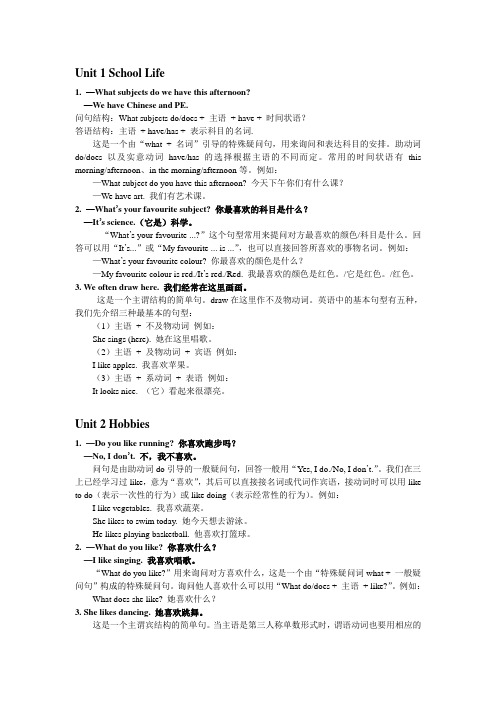
Unit 1 School Life1. —What subjects do we have this afternoon?—We have Chinese and PE.问句结构:What subjects do/does + 主语+ have + 时间状语?答语结构:主语+ have/has + 表示科目的名词.这是一个由“what + 名词”引导的特殊疑问句,用来询问和表达科目的安排。
助动词do/does以及实意动词have/has的选择根据主语的不同而定。
常用的时间状语有this morning/afternoon、in the morning/afternoon等。
例如:—What subject do you have this afternoon? 今天下午你们有什么课?—We have art. 我们有艺术课。
2. —What’s your favourite subject? 你最喜欢的科目是什么?—It’s science.(它是)科学。
“What’s your favourite ...?”这个句型常用来提问对方最喜欢的颜色/科目是什么。
回答可以用“It’s...”或“My favourite ... is ...”,也可以直接回答所喜欢的事物名词。
例如:—What’s your favourite colour? 你最喜欢的颜色是什么?—My favourite colour is red./It’s red./Red. 我最喜欢的颜色是红色。
/它是红色。
/红色。
3. We often draw here. 我们经常在这里画画。
这是一个主谓结构的简单句。
draw在这里作不及物动词。
英语中的基本句型有五种,我们先介绍三种最基本的句型:(1)主语+ 不及物动词例如:She sings (here). 她在这里唱歌。
(2)主语+ 及物动词+ 宾语例如:I like apples. 我喜欢苹果。
鲁教版小学四年级下册英语知识点归纳
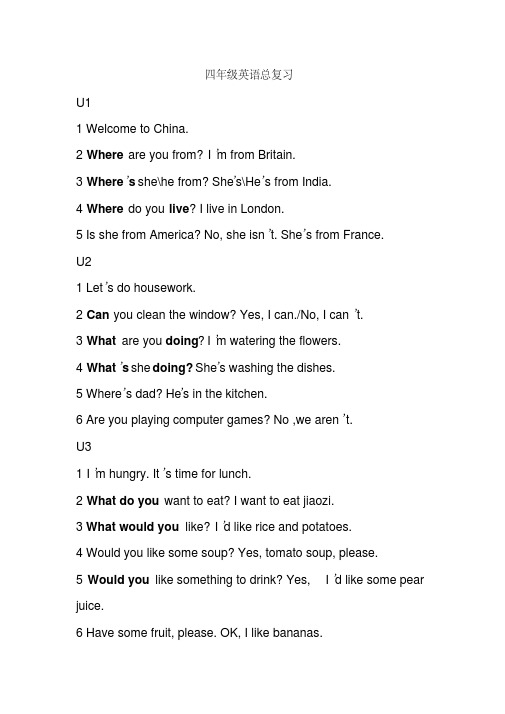
四年级英语总复习U11 Welcome to China.2 Where are you from? I’m from Britain.3 Where’s she\he from? She’s\He’s from India.4 Where do you live? I live in London.5 Is she from America? No, she isn’t. She’s from France.U21 Let’s do housework.2 Can you clean the window? Yes, I can./No, I can’t.3 What are you doing? I’m watering the flowers.4 What’s she doing? She’s washing the dishes.5 Where’s dad? He’s in the kitchen.6 Are you playing computer games? No ,we aren’t.U31 I’m hungry. It’s time for lunch.2 What do you want to eat? I want to eat jiaozi.3 What would you like? I’d like rice and potatoes.4 Would you like some soup? Yes, tomato soup, please.5 Would you like something to drink? Yes, I’d like some pear juice.6 Have some fruit, please. OK, I like bananas.U41 Have a nice weekend.2 What do you do at the weekend? I often take pictures. Sometimes I go to the museum.3 What does your mother do at the weekend? She often goes shopping.4 Do you often take pictures? Yes, I do..5 Does he often play the violin? Yes, he does/ No, he doesn’tU51 Can I help you? I’d like a toy, please.2 How about this toy bus ? It’s too big. I want a toy car.3 Excuse me. Do you have schoolbags? Yes, we do./ Sorry we.don’t4 How much is this shirt? It’s one hundred yuan. I’ll take it.5 How much are they? They’re fifty-eight yuan. Ok, we’ll take them.U61 Summer vacation is coming.2 Are you going to travel? Yes, I’m going to Mount Taishan.3 Where are you going ? I’m going to the Shaolin Temple.4 How are you going there? I’m going there by train.5 What are you going to do? I’m going to learn Kongfu.。
鲁科版四年级上册英语每单元核心内容

鲁科版四年级上册英语每单元核心内容第一单元:欢迎你- 研究目标:研究基本的问候语和自我介绍。
- 核心内容:- 问候语:Hello! Hi! Good morning! Good afternoon! Good evening!- 自我介绍:My name is {name}. I am {age} years old. Nice to meet you!- 扩展内容:How are you? I'm fine, thank you. And you? Goodbye. See you later.第二单元:完美的一天- 研究目标:研究描述每天的日常活动。
- 核心内容:- 时间表达:morning, afternoon, evening- 日常活动:get up, wash my face, have breakfast, go to school, have lunch, do homework, play games, go to bed第三单元:我的家庭- 研究目标:研究描述家庭成员和家庭环境。
- 核心内容:- 家庭成员:father, mother, brother, sister, grandparents- 描述家庭成员:My father's name is {name}. He is {age} years old. He works as {n}. My mother's name is {name}. She is {age} years old. She is a {n}.- 家庭环境:living room, bedroom, kitchen, bathroom第四单元:快乐的时光- 研究目标:研究描述喜欢的活动和快乐的时刻。
- 核心内容:- 活动:sing, dance, draw, play football, read books- 描述喜欢的活动:I like {activity}. It's fun/___.- 快乐时刻:Celebrate birthdays, have parties, go to the park, watch movies第五单元:美味食物- 研究目标:研究描述食物和用餐。
鲁科版四年级上册英语每单元重点

鲁科版四年级上册英语每单元重点Sunday星期日重点短语:go to school去上学have classes上课do homework做作业play with XXX和朋友玩watch XXX看电影go shopping去购物have a ic野餐重点句子:1.---- What day is it today?XXXSaturday / Sunday.2.---- What do you usually do on weekends?I usually play with my XXX.3.---- Do you like going shopping?Yes。
I do。
/ No。
I don’t。
I prefer having a ic.Sunday:常用搭配短语:踢足球:play football打篮球:play basketball弹钢琴:play XXX拉二胡:play XXX画画:draw pictures打太极拳:do XXX在星期三:on XXX重点句子:1.——今天是星期几?今天是星期四。
2.我可以在星期二画画。
我们可以在星期三踢足球。
3.——你周六做什么?我经常打篮球。
我们经常拉二胡。
第四单元重点:词汇分类:1)季节单词:春天:spring夏天:summer 秋天:XXX冬天:winter2)天气单词:温暖的:warm 热的:hot凉爽的:cool 寒冷的:XXX3)衣着单词:T恤衫:T-shirt 夹克衫:jacket 毛衣:sweater 外套:coat帽子:cap4)表示动作的单词:穿、戴:wear飞、飞行;放(风筝等):fly游泳:swim溜冰、滑冰:skate惯搭配短语:放风筝:XXX游泳:go swimming滑冰:go skating穿毛衣:wear sweaters去滑冰:go skating什么季节:what XXX在一年里:in a year在春季/夏季/秋季/冬季:in spring/summer/autumn/winter 怎么样:what about(征求意见或询问消息时用)重点句子:1.——现在是什么季节?现在是秋天。
鲁科版四年级英语上册语法汇总

四年级英语上册语法总结一、固定搭配及用法 1. 喜欢做某事:like + 动词ing形式I like dancing.2. My hobby is + 动词ing形式My hobby is dancing.(以上2种情形须使用动词ing形式,请牢记;注意对比区分现在进行时)3. on + 星期几I can draw pictures on Thursday.4. in + 季节It’s warm in spring.in + 城市名称It’s raining in Shanghai.5. play的用法1) play 直接加球类play football play basketball play ping-pong2) play + the + 乐器play the drums play the erhu play the pipa6. will + 动词原形It will rain in Hong Kong. It will snow in Ningyang.will + be + 形容词It will be sunny tomorrow. It will be windy in Shenyang.7. 情态动词(will, can, shall, may) + 动词原形will + 动词原形It will snow in Ningyang. can + 动词原形I can dance on Monday. shall + 动词原形Shall we go to the park? may + 动词原形May I have a look?8. 描述人物时is 和has 的不同用法My brother is short. He has short hair and big eyes.9. an an art teacher an English teacher an email10. 名词所有格: …’s,表示:…的What’s Xiaobai’s hobby?That’s Liu Lei’s father.11. 首字母大写Sunday-----Saturday(星期几词汇) Chinese English T-shirtDanny Guo Y ang Beijing Kunming(人名地名)二、动词的第三人称单数 1. 适用范围---主语是he, she, 人名,my sister/your father2. 变化规则1) 规则变化直接+s Danny likes playing the drums.He plays well. My grandpa works in a park.2) 不规则变化have --- has I have big eyes. He has small eyes.do --- does What does your mother do?三、现在进行时1. 含义:表示正在进行的动作或存在的状态。
鲁科版四年级英语上册语法精要

鲁科版四年级英语上册语法精要1. 名词(Noun)名词是表示人、事物、地方和抽象概念的名称。
名词一般由单数和复数形式,还有所有格形式。
- 单数名词: 表示一个人、一个事物或一个地方。
例如:book (书)、apple(苹果)、China(中国)。
- 复数名词: 表示多个人、多个事物或多个地方。
例如:books (书籍)、apples(苹果)、countries(国家)。
- 所有格: 表示某人或某物所属关系。
例如:John's book(约翰的书)、the cat's tail(猫的尾巴)。
2. 代词(Pronoun)代词是用来代替名词的词语。
代词可以分为人称代词、物主代词和指示代词。
- 人称代词:用来代替人的身份,分为主格和宾格。
例如:I (我)、you(你)、he(他)。
- 物主代词:用来代替所属关系,分为形容词性和名词性。
例如:my(我的)、your(你的)、his(他的)。
- 指示代词:用来指示人或物的位置。
例如:this(这个)、that(那个)、these(这些)、those(那些)。
3. 动词(Verb)动词是表示行为、状态或出现的词语。
动词的时态包括现在时、过去时和将来时。
- 现在时:表示现在正在进行的动作。
例如:I eat an apple.(我正在吃一个苹果。
)- 过去时:表示过去发生的动作。
例如:I ate an apple.(我吃了一个苹果。
)- 将来时:表示将来要发生的动作。
例如:I will eat an apple tomorrow.(明天我将吃一个苹果。
)4. 形容词(Adjective)形容词用来描述名词的特征或性质。
形容词一般放在名词前面。
- 例句:- A big book(一个大书)- The beautiful flower(美丽的花)5. 副词(Adverb)副词用来描述动词、形容词或其他副词的程度、方式或时间。
- 例句:- He runs fast.(他跑得快。
鲁科版四年级英语上册语法综述

鲁科版四年级英语上册语法综述
本文档对鲁科版四年级英语上册的语法知识进行综述,总结以下几个要点:
1. 时态:四年级上册英语主要涉及一般现在时和一般过去时。
一般现在时用于描述经常发生的动作或真实情况,一般过去时用于描述发生在过去某个时间的动作或事件。
2. 句式结构:英语句子由主语、谓语和宾语构成。
四年级上册介绍了基本的句子结构,并通过练帮助学生巩固掌握。
3. 疑问句:四年级上册研究了构建疑问句的方法。
通过改变句子的语序或使用助动词,可以将陈述句转变成疑问句。
4. 名词:四年级上册研究了常见的名词,如人名、地名、物品等,并研究了名词的单数形式和复数形式。
5. 形容词:四年级上册研究了形容词的基本用法,如形容词作定语、表语和补语等。
6. 副词:四年级上册介绍了一些常用的副词,如时间副词、地
点副词和程度副词等。
学生需要通过练掌握副词的正确用法。
7. 冠词:四年级上册研究了冠词的基本用法,如不定冠词a/an
和定冠词the的使用。
8. 代词:四年级上册介绍了一些常用的代词,如人称代词和物
主代词,并研究了它们在句子中的作用。
9. 介词:四年级上册研究了一些常见的介词,如in、on、at等,并研究了介词与名词、动词等的搭配。
10. 动词:四年级上册介绍了一些常用的动词,如be动词和行
为动词,并研究了它们的用法和变化形式。
以上是对鲁科版四年级英语上册语法知识的综述。
学生们需要
通过课堂学习和大量的练习来巩固掌握这些知识点,以提高自己的
英语语法水平。
鲁教版小学英语语法归纳总结

鲁教版小学英语语法归纳总结英语语法在学习英语过程中扮演着重要的角色。
掌握好英语的基本语法规则,能够更准确地表达自己的意思,并且有助于提高英语的听说读写能力。
本文将对鲁教版小学英语中的常见语法知识进行归纳总结,帮助读者更好地掌握英语语法。
一、名词名词是指表示人、事物、动物、地点等具体或抽象概念的词语。
名词通常有单数和复数两种形式,单数形式表示一个,复数形式表示多个。
在英语中,构成复数名词有多种规则,如加-s,-es,-ies等。
例句:- I have two cats.(猫的复数形式)- My sister likes to eat apples.(苹果的复数形式)名词还可以分为可数名词和不可数名词。
可数名词表示可以计数的事物,而不可数名词表示无法计数的事物。
例句:- I have three books.(可数名词,书的复数形式)- I need some water.(不可数名词,水无法计数)二、代词代词是用来替代名词在句子中的一种词语。
常见的代词有人称代词、物主代词、反身代词等。
人称代词分为主格和宾格两种形式。
主格代词用于句子的主语位置,宾格代词用于句子的宾语位置。
例句:- She is my friend.(她是我的朋友,主格代词)- I like her.(我喜欢她,宾格代词)物主代词用来表示所属关系,常见的物主代词有my、your、his、her等。
例句:- This is my book.(这是我的书)反身代词表示动作的主体同时也是动作的承受者。
例句:- I hurt myself.(我伤害了自己)三、动词动词是表示动作、状态或存在的词语。
在英语中,动词的形式会随着句子的主语的人称和数的变化而变化。
例句:- He reads books.(读的第三人称单数形式)- They play soccer.(玩的第三人称复数形式)动词还有时态的变化,常见的时态有一般现在时、一般过去时和一般将来时。
鲁科版四年级上册英语每单元重要学习内容

鲁科版四年级上册英语每单元重要学习内容Unit 1: Hello! I'm Amy.- Greetings: Hello, Hi, Good morning, Good afternoon, Goodbye - Self-introduction: My name is Amy. I'm a girl. I'm 8 years old.- Classroom objects: desk, chair, book, pen, pencil, rulerUnit 2: Family- Family members: father, mother, brother, sister, grandfather, grandmother- Possessive 's: my, your, his, her- Family relationships: uncle, aunt, cousin- Family activities: playing games, watching TV, eating togetherUnit 3: Food and Drinks- Food items: noodles, rice, bread, dumplings, cake- Drinks: water, milk, orange juice- Expressions: I'm hungry. I'm thirsty. Can I have some...?Unit 4: Numbers- Counting numbers: 1-100- Ordinal numbers: first, second, third, fourth- Asking for quantity: How many...? How much...?Unit 5: Colors and Shapes- Colors: red, blue, yellow, green, purple, orange- Shapes: circle, triangle, square, rectangle- Describing objects: It's a red ball. It's a blue square.Unit 6: My Body- Body parts: head, eyes, ears, mouth, nose, arms, hands, legs, feet - Actions: touch, clap, jump, run- Feelings: happy, sad, tired, hungry, thirstyUnit 7: Clothes- Clothing items: hat, T-shirt, shirt, dress, pants, socks, shoes- Describing clothes: It's a blue hat. They're red pants.- Weather expressions: It's sunny. It's rainy. It's windy.Unit 8: My Home- Rooms in a house: living room, bedroom, kitchen, bathroom- Furniture: table, chair, bed, sofa, fridge, TV- Describing locations: in, on, under, behind, besideUnit 9: Animals- Animals: dog, cat, bird, monkey, rabbit, fish- Animal sounds: woof woof, meow meow, tweet tweet- Describing animals: It's a big dog. It's a small cat.Unit 10: Toys and Games- Toys: ball, doll, kite, toy car, puzzle- Games: hide and seek, tag, jump rope, chess- Asking for permission: Can I play...? Can we play...?以上是鲁科版四年级上册英语每单元重要学习内容的简要总结。
- 1、下载文档前请自行甄别文档内容的完整性,平台不提供额外的编辑、内容补充、找答案等附加服务。
- 2、"仅部分预览"的文档,不可在线预览部分如存在完整性等问题,可反馈申请退款(可完整预览的文档不适用该条件!)。
- 3、如文档侵犯您的权益,请联系客服反馈,我们会尽快为您处理(人工客服工作时间:9:00-18:30)。
四年级知识点总结
Unit 1
语音:j--/ / jump,juice,June,July w--/ / well,warm,winter,wear
U--/ / music,menu,cute,computer
词汇:(1)核心词汇:中国来自她;她的生活;居住
(2)国家:加拿大美国英国澳大利亚印度法国
城市:渥太华伦敦华盛顿市形容词:著名的
句型:(1)你叫什么名字?我的名字叫吉姆。
(2)你来自哪里?我来自加拿大。
(3)你住在哪里?我住在渥太华。
(4)欢迎来到中国。
(5)伦敦是著名的。
(6)她来自哪里?她来自澳大利亚。
(7)他来自哪里?他来自伦敦。
(8)他来自美国吗?不,他不是。
他来自法国。
wh开头的疑问词:
疑问代词:what 什么who 谁which 哪个whose 谁的
疑问副词: when 什么时候where 哪里why 为什么
Unit 2
语音:y--/ / yes,your,year,yellow s--/ / his,please,these,Tuesday
e--/ / egg,get,bed,help
词汇:动词:弄干净;擦干净洗;冲洗水;给…...浇水
名词:鞋窗户衣服花家务劳动一餐(饭)盘子
感叹词:美味的
句型:(1)你会刷你的鞋吗?是的,我会。
(2)你会擦窗户吗?不,我不会,(3)让我们做家务劳动吧! (3)你正在做什么?我正在洗衣服。
(5)你正在做饭吗?是的。
我正在烹饪鸡肉。
(6)妈妈正在做什么?她正在洗盘子。
(7)我做不好。
(8)午饭准备好了。
语法:现在进行时be(am/is/are)+动词-ing 正在做...
短语:做家务劳动刷我的鞋擦窗户擦地板洗衣服做饭
烹饪鸡肉浇花洗盘子打扫厨房玩电脑游戏做面包
Unit 3
语音:c--/ /nice,rice,face,dance c--/ /cap,call,cold,come 词汇:动词:想要吃等;等待喝;饮名词:面条食物土豆汤西红柿分;分钟;片刻蛋糕;糕点水果香蕉比萨饼梨子其他:到外面;在外某物
句型:(1)你(们)想要吃什么?我/我们想要吃饺子。
(2)你(们)想要什么?我/我们想要米饭和土豆。
